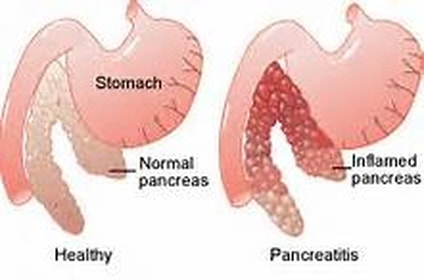Pancreatitis in Pets
The pancreas is a vital organ located in the abdomen near the stomach and small intestine. The pancreas has many functions, including the production and secretion of digestive enzymes and the production of insulin. Digestive enzymes are critical for food digestion, while insulin aids in the control of the metabolism and blood-sugar levels.
Pancreatitis means “inflammation” of the pancreas. There are two main forms of pancreatitis: 1) "acute"- meaning sudden in onset and 2) "chronic"- a process of recurrent or persistent pancreatic inflammation. When the pancreas becomes inflamed, digestive enzymes that are normally inactive until they reach the small intestine become active in the pancreas instead—resulting in pain and swelling as the pancreas actually begins to digest itself.
Pancreatitis means “inflammation” of the pancreas. There are two main forms of pancreatitis: 1) "acute"- meaning sudden in onset and 2) "chronic"- a process of recurrent or persistent pancreatic inflammation. When the pancreas becomes inflamed, digestive enzymes that are normally inactive until they reach the small intestine become active in the pancreas instead—resulting in pain and swelling as the pancreas actually begins to digest itself.
The most common symptoms of acute pancreatitis in dogs are: loss of appetite, vomiting, and abdominal pain. Lethargy and appetite loss are the most frequently seen symptoms in cats. Most pets are stoic when it comes to pain and they may not easily reveal their pain level to you. Signs of abdominal pain in pets may include: restlessness / inability to get comfortable, having a hunched posture or standing in a "prayer position" (with forelimbs stretched out in front and rump in the air with tail down), or tensing / whining when being picked up or pet on the belly. Your pet may also exhibit: lethargy, diarrhea, fever, or a swollen abdomen.
The exact cause of pancreatitis is not always known. The most important risk factor for dogs is ingestion of a rich, fatty meal. Veterinarians see an increase in pancreatitis cases around the holidays, since many people share their holiday meals with their pets. Cats often develop pancreatitis for undetermined reasons.
Pancreatitis can occur in any dog, but some breeds are more susceptible to this disease. They include the miniature schnauzer, miniature poodle, and cocker spaniels. Additionally, pancreatitis is more common in middle-age to older pets, overweight pets, and females.
Pancreatitis can occur in any dog, but some breeds are more susceptible to this disease. They include the miniature schnauzer, miniature poodle, and cocker spaniels. Additionally, pancreatitis is more common in middle-age to older pets, overweight pets, and females.
Your veterinarian will take a complete history and perform a thorough physical exam. Additionally, diagnostic tests will be required.
These may include:
These may include:
- Bloodwork to look for increased pancreatic enzyme levels and to look for secondary disease (such as kidney, liver, or blood sugar abnormalities).
- Xrays of the abdomen. A normal pancreas is NOT visible on xray, but a diseased pancreas may cause severe inflammation or even internal bleeding which can be detected on xrays.
- Fluid therapy - to correct dehydration and electrolyte loss
- Pain medication for comfort.
- Anti-nausea medication to improve appetite or decrease vomiting.
- Antibiotics if a bacterial infection is suspected.
- Nutritional counseling- pet's that have severe vomiting may need to be fasted for a long period in order to "rest" the pancreas. If your pet's vomiting can be controlled, then your veterinarian will recommend a special low fat diet in small, frequent meals until symptoms resolve. Even after your pet has recovered- recurrence is a risk. Your veterinarian may recommend a long term low fat prescription diet.
- Depending on severity, hospitalization, blood transfusion, or other medications may be advised.
- Keep in mind that your veterinarian may recommend repeated bloodwork to evaluate treatment success.
While you can’t completely prevent pancreatitis, the following will help reduce the risk of your pet developing the disease: - Don’t let your dog become overweight—weight management is just as important for our four-legged friends as it is for us!
- Avoid high-fat diets.
- Avoid giving your dog table scraps, especially if he isn’t accustomed to eating people food. (especially fatty meat scraps and pork products).
- Make sure you discuss all medications your dog is receiving with your veterinarian.
- Don’t let your dog have access to garbage!
The overall prognosis for a pet with pancreatitis depends on the extent of the inflammation and how your pet responds to initial therapies. Most of the mild forms of pancreatitis have a good prognosis, but pets that exhibit shock or depression may not recover.
Long term consequences of severe or recurrent pancreatitis include:
1) Exocrine Pancreatic Insufficiency (EPI)- the significant destruction of the pancreatic cells needed to produce digestion enzymes resulting in the inability to properly digest food.
2) Diabetes- occurs when the cells of the pancreas that produce insulin are destroyed.
3) Chronic, "smoldering" pancreatitis- repeated bouts of pancreatic symptoms.
Long term consequences of severe or recurrent pancreatitis include:
1) Exocrine Pancreatic Insufficiency (EPI)- the significant destruction of the pancreatic cells needed to produce digestion enzymes resulting in the inability to properly digest food.
2) Diabetes- occurs when the cells of the pancreas that produce insulin are destroyed.
3) Chronic, "smoldering" pancreatitis- repeated bouts of pancreatic symptoms.

